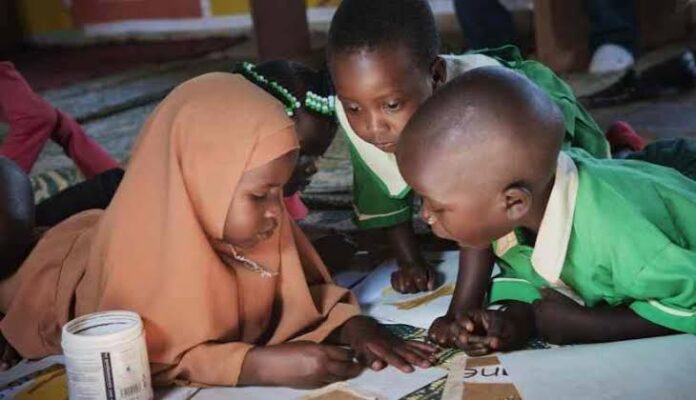UBEC and Transmission of Early Child Care and Development Education (ECCDE)
By Abubakar Yusuf
Aside the monitoring, coordination and implementation of basic Education particularly the 6-3-3-4 policy , the current management under the leadership of Dr. Hamid Bobboyi continue to fine tune series of programs that will reduce to the barest minimum the global scourge of Out of the School Children (OOSC), that had a dire consequences on both underdeveloped and developing countries like Nigeria.
Therefore, the introduction of the Early Child Care and Development Education (ECCDE), was not only to take school age children off the streets, but developed a template that is routinely observed to inculcate through acculturation the desire for taken child into formal training and control with the new format.
This is been carried out by the commission in collaboration with Federal Ministry of Education (FME), United Nations Children Education Fund (UNICEF), to develop a national road map deploying both human and instructions with stakeholders through workshops, talkshops, seminars and symposium across the 36 states of the country, including the FCT, trickled down to 776 local government areas.
This actionable decisions mooted by the Management of the commission across the country with stakeholders in education will rejig the basic knowledge and care expected in the public schools not only to compete favourably with the private schools were children of the well to do in the society are secluded and trained, but also in the public primary schools.
The I year Pre-primary Education program for the children between the ages of 3-5 years known as creche or kindergarten in private schools will bridge the wide gap between the imported curriculum and the basic requirements put in place in the Education curriculum by the commission to mitigate and encourage enrollment in public schools across the country.
Read Also:
The Early Child Care and Development Education (ECCDE) will glaringly reinforce the position and efforts supported by both local and international stakeholders to take the over 20M out of school children OOSC, that had grown to alarming rates inspite of concerted efforts by UBEC and other government agencies in partnerships with the international agencies to mitigate the problems.
The National roadmap convened by UBEC will no doubt chart a new action that will develop the psyche of children from the foundation stage of early Child hood, towards not only impacting quality Education, but care and concern that will guide and guard learners premonition from tender age to adulthood.
This will also encourage functional, high and the right acue for children within the age group and opened both conscious and unconscious competitive and healthy early learning atmosphere within the age group.
The stakeholders contemplation and international supports will also address the incidence of illiteracy in our society, through conscientisation and Inculcation of care and early child development in Education, without recourse to environmental and family stratification.
With the supports of the local and critical stakeholders particularly the National Commission for Colleges Education, NCCE , Federal Ministry of Education FME, Federal Ministry of Health and Federal Ministry of Women Affairs charged with both development of Education curriculum at the post basic and Educational level, well being of the children and care, no doubt , the Early Child Care and Development Education (ECCDE), will not only transform basic Education, but institutionalised the program to enhance qualitative Education and transfer of learning from early childhood to adulthood.
With concerted efforts and determination by the current management with continuous supports from government , international partners and stakeholders, the unresolved problems of erratic early child upbringing, care and Education will be reduced to the barest minimum subsequently.
The Inculcation and implementation of 1year Pre-primary with emphasis on ages from 3-5years devoid of disparity, no doubt the fusion of the new system as part of the National Policy on Education will close the gap of child care and learning in all areas of our Educational Development.
It is germane that laudable government policies and programs such as this, should not only be encouraged, but institutionalised to address the unabated distress of Out of School Children (OOSC), in Nigeria.
Yusuf , A Public Affairs Analyst, Writes from Abuja and can be reached on [email protected].
















